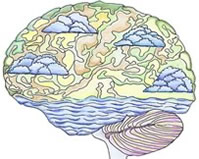useNature.com ... for Brain Plasticity Therapy Concepts
Brain Plasticity - Active Prevention
Brain Plasticity - Norman Doige, MD
Prevention of decline in Brain Plasticity
Article: Active Prevention - Prevent decline of Brain Plasticity
Brain Plasticity - Active Prevention Strategies
... your daily holistic body - brain - mind - active prevention (habit) exercise.
... 'Curating' your daily activities and lifestyle!
..... by Dieter Luske N.D.-D.C.H.-D.M.H.-D.H
Holistic Therapy Consultant - Gold Coast - Canungra
Author of It happened in the seventies ... and ...
|
For Brain Health, you need physical and mental exercise; and as the saying goes; "but that's not all".
The Science of Brain or Neuroplasticity certainly has been a game changer.
We have addressed the topic of habits already, see Brain Change Habits, however, lets look a bit deeper at the overall implications of habits, with the focus to find out how we can prevent brain, body and mind degeneration and ill health.
For the moment ...... think of the human life as one "huge bunch of habits".
if you really think about it, everything is a habit, everything you do over and over again. To make a list of everything would be too time consuming, therefore lets just concentrate on a few major ones, and come to terms with the fact that:
"We are our Habits"
Here are a few Habits which all have direct noticeable health implications;
... and all can be changed with Active Prevention principles.
-
Getting up in the morning - Are you still tired, not enough sleep, went to bed too late, sleeping too long - room too warm - room too light - closed windows - taking your work into the bedroom; these are all habits that can be changed into positive sleep habits, to get a positive outcome.
-
Diet - the food you eat. - Are you eating junk food - refined food - eating in a hurry - getting up to late and have no breakfast - always in a hurry, stressed, no time to eat - eat while watching TV or working on the computer.
Your taste is a habit, taste is acquired - you don't need the extra sweets, alcohol, coffee, soft drink for your health. Not liking health food can be a habit as well.
The whole diet industry is build upon people's vulnerability to be slaves to their taste habits, and their emotional instant gratification habits, in addition to addictive habits. -
Work - most work associated behaviour falls into the category of habits, one really bad habit for office people is sitting all day long. Yes, it's a habit we have accepted, even so, we know better. Workplace behaviour and interaction with colleagues or clients is another large group of habits.
Yes, you actually can be right without making someone else wrong. -
Stress - We experience different type of stresses. Stress stimuli out of our control, like a person close to us has died, nothing we can do, hopefully our good habits carry us back to happiness again. All other stresses are born out of habits, and carry the excuse; "it's not my fault", ... but it usually is. Money stresses, are on the forefront, but of course no one of us would be guilty of overspending and not having a budget. Most people know they have wrong money, or work associated habits, but that's what they know best and therefore they carry on as "business as usual".
And yet another form of stress is health related, allergies, inflammation are body stresses, and again, we often have a choice to choose "health" habits instead of burning the candle at both ends. -
Exercise - or the habit of no exercise, never getting around to do exercise, no time, too busy.
-
Attitudes - how you think about something can have a huge impact on your brain as well as your physical health.
What does that all mean?
Your brain’s plasticity is controlled by your habits, your thoughts, your diet and lifestyle choices.
General Prevention against decline in health & brain plasticity:
'Curating' your daily activities and lifestyle.
-
Curating is different from planning or setting goals, curating is about; what to put into your day or life and what to leave out.
Anything not needed or recognised as destructive can be taken out by "unlearning that particular habit". -
Create a list of positive things to do, and select what is appropriate into your daily list.
- Take note of your unwanted habits, and de-select them from your daily curated list.
Unlearning bad habits.
The first step to unlearn bad habits is to acknowledge them, its a bit like being an alcoholic, first you need to admit that you are an alcoholic, or as in our topic, a "creature of habit".
Lets reflect on the positive key points of better Brain Plasticity
-
Brains with more multiply pathways have more effective plasticity.
-
Each time you embark, or are confronted with a new experience, your brain is enriching its network of neurons and neural pathways.
Tip: embrace new experiences. -
Every time you learn something new, your brain creates neural passages to sustain that knowledge or skill.
Tip: Learn a new skill or language. -
Under-stimulated brains lose plasticity because neural pathways are underused and underdeveloped.
Tip: Use it or lose it. -
Brain specific exercises can increase brain plasticity.
Tip: Create your own exercise or subscribe to a brain training web-site.
-
Well known Body/Brain specific exercise are: Feldenkrais - Tai Chi - Yoga
Brain Plasticity Facts:
- You can change your genetic destiny.
- Your brain’s memory centre regenerates.
- You are constantly growing new brain cells into your 50s, 60s, 80s, and 90s – throughout your lifetime – through a process called neuro genesis.
- You can turn on your genes through lifestyle choices that enhance neuro genesis and that enhance re-growth of cells and expansion of your brain’s memory centre.
For Brain Health, You need Physical AND Mental Exercise
Recent science has shown that physical exercise is as important as mental exercise when it comes to keeping your mind fit, it improves IQ scores, and help prevent brain deterioration as you age.
Engaging in challenging new activities throughout your life, staying socially active, and practicing “mindfulness” are other ways to boost your brain function.
You will need to have a genuine interest in your chosen activities, it's all about intention and intensity.
Brain Plasticity Active Prevention Strategies
Protect Your Brain with Wise Lifestyle Choices:
-
First of all, "Change a Habit", or break a routine, to stimulate and create new neural pathways with new experiences.
(More proactive change) -
Adopt good sleeping habits ..
-
Diet - Good Nutrition - I would recommend the intermittent fasting diet - it not only works well it also breaks up habits ... 2 days of less food is a good habit breaker. Personally, I make those 2 days, grain free.
-
Conscious Breathing - a few times a day, concentrate or your breathing pattern, slow it down and breath deeply.
-
Appropriate sun exposure, for your Vit. D and other health benefits (Heliotherapy) You may want to make your sun exposure time a time to meditate as well. - Sun, air and light form the basis from which all life springs, you better get yourself some of it.
-
Digestive Health: Aim for Good Nutrition. Your gut is your “second brain;” beneficial bacteria - probiotics - transmit information from your GI tract to your brain via your vagus nerve.
-
Reducing overall calorie consumption.
-
Stress will diminish brain activity. - Eliminate stress.
Permanent stress will increase risk for mental disorder, especially later in life with symptoms of anxiety and depression.
Stress Busters like; Lifestyle change - Daily Habit changes - Relaxation - Meditation - exercises and techniques such as Emotional Freedom Technique (EFT), yoga - feldenkrais. -
Emotional Release. - Recent research has shown that EFT (or “tapping”) significantly increases positive emotions, such as hope and enjoyment, and decreases negative emotional states, such as anger and shame.
-
Your brain can literally be rewired, and you are doing so already—every day of your life, just make sure it is in the right direction.
-
Mental and Visual Exercises; learn something new and start a creative pursuit, like art classes. Creativity need to be expressed, find your way of doing that. - Creating and appreciating art are powerful ways to develop a healthy brain.
Build and strengthen neural pathways by switching hands to do an activity, which forces the brain to adapt by forming new neural connections.
Strengthen your Senses by closing your eyes and get dressed, switch off the lights and walk in the dark. This strengthened underused neural pathways.
Learn a new language, study actively, pronouncing word sounds for at least 10 to 30 minutes every day. Plan your learning and take it seriously.
Learn or re-learn a musical instrument. Playing an instrument, exercises your reading, listening, fine and high-speed manual control pathways.
-
Exercise, a wide variety, from walking to yoga, and include especially high-intensity interval training, as well as balance exercises.
Learn to juggle, it requires visual tracking, and leads to fast and flexible motor responses, great for both the brain and body.
Dance or learn to dance, or join a class in Feldenkrais - Tai Chi - Yoga -
Relaxation - Meditation - Visualization, could be the key factor to your enhanced health experience. Include some emotional reframing ( NLP) or emotional freedom training EFT. Prayers and Mantras are a form of meditation.
-
Do self-hypnosis. - You can change your thought process and learn how to switch your focus by doing some self-hypnosis. Research shows that with self-hypnosis, a person gets to experience reduced stress, increased tolerance to pain, and sharper thinking.
-
Think deep - Analyse: Thinking is good, philosophise, and learn something new. Expand neural pathways by re-evaluating your attitudes, why do you do what you do, your feelings, and everything around you.
-
Use your "Hand" Writing, even improve it, writing by hand helps a person develop a kinaesthetic sense by allowing the brain to process information more effectively.
-
Get organised, clean up your house or room, if in doubt - chuck it out ... less mess creates a clearer mind.
... the next article is on: Chronic Pain Treatment Protocol
... or go back to the main Brain Plasticity Menu
Please contact me directly for more info or Research Participation: Dieter L. - Editor
* Disclaimer - Any general advice given in any article should not be relied upon and should not be taken as a substitute for visiting a qualified medical Doctor.
 Dieter Lüske - Editor
Dieter Lüske - Editor
N.D.-D.C.H.-D.M.H.-D.H
Editor's Articles
Happy Brain - No Pain
Brain Plasticity T-shirts and other printed products.
Buy Now
It happened in the seventies
A Memoir of Love, Colliding Worlds and a House on a Hill
Intriguing story of personal risk-taking, self-discovery and profound change.
Dieter Luske
author . writer . editor
© 1998 - 2024 useNature.com: Australia - Dieter Luske - Writer - Creative Lifestyle Portal - Natural Holistic Health - Books & Art -
Site Map - Terms / Privacy | Global Health | Free Alpha Music | Photography | Natural Links |



